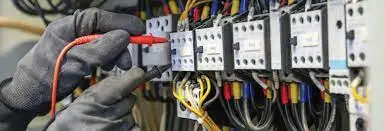
In the vast realm of industrial manufacturing, one crucial aspect that silently powers the heart of operations is industrial electrical wiring. This simple-sounding term carries a significant impact on the efficiency and safety of various machinery and processes within the industrial landscape. Let’s take a journey into the world of industrial electrical wiring and explore how it plays a vital role in boosting engineering feats.
“Efficient wiring doesn’t just connect, it powers the future of industrial evolution.”
Understanding Industrial Electrical Wiring
In the simplest words, industrial electrical wiring involves the intricate network of wires, cables, and connectors that carry electrical power throughout an industrial facility. It’s like the veins and arteries of a manufacturing plant, ensuring that electricity reaches every corner, powering the machinery that keeps the production wheels turning.
The Basic Components Electrical Wiring
- Wires: These are like the roads electricity travels on. Wires come in different sizes and materials, with copper being a common choice due to its excellent conductivity.
- Connectors: Think of connectors as the bridges that allow electricity to jump from one wire to another. They come in various shapes and sizes, ensuring a secure and efficient flow of power.
- Switches: Similar to traffic lights, switches control the flow of electricity. They turn it on and off, providing a crucial element of control in industrial processes.
The Importance of Efficient Wiring in Industrial Manufacturing
Safety First
When it comes to industrial settings, safety is paramount. Efficient electrical wiring ensures that electricity travels where it should without any detours or leaks. This minimizes the risk of electrical faults, short circuits, and other hazards that could pose a threat to both machinery and personnel.
Reliability and Consistency
Imagine a manufacturing plant where the machines stop unexpectedly due to electrical issues. Efficient wiring minimizes downtime by ensuring a consistent and reliable power supply. This reliability is the backbone of uninterrupted production.
Optimizing Energy Usage
In the world of industrial manufacturing, every bit of energy counts. Efficient electrical wiring not only ensures a steady power supply but also minimizes energy loss during transmission. This leads to cost savings and a more eco-friendly operation.
Technological Advances in Industrial Electrical Wiring
Smart Electrical Wiring Systems
Just as our homes have become smarter with the introduction of smart devices, industrial electrical wiring has also evolved. Smart wiring systems use advanced technologies to monitor and optimize power usage, providing real-time data that helps in making informed decisions about energy efficiency.
Automation Integration
Industrial automation is the buzzword of the century. Efficient wiring plays a crucial role in seamlessly integrating automated systems into the manufacturing process. It’s the silent conductor orchestrating the symphony of automated machinery.
Challenges and Solutions in Industrial Electrical Wiring
Space Constraints
In many industrial settings, space is a precious commodity. Efficient wiring solutions involve clever designs that maximize the use of available space without compromising safety and functionality.
Temperature Considerations
Industrial environments can be harsh, with extreme temperatures posing a challenge to electrical systems. Specialized wiring that can withstand high temperatures ensures continued operation in such demanding conditions.
Upgrading Legacy Systems
Many industrial facilities still operate with older electrical systems. Upgrading to modern, efficient wiring solutions can be a complex process but is essential for staying competitive in the rapidly evolving landscape of industrial manufacturing.
The Future of Industrial Electrical Wiring
As technology continues to advance, so does the landscape of industrial electrical wiring. The future holds promises of even more intelligent and adaptive systems, seamlessly integrating with the Industrial Internet of Things (IIoT) and paving the way for Industry 4.0.
Practical Application
Let’s say you work in a big factory, and there’s a sudden power outage. Thanks to efficient industrial electrical wiring, the machines automatically shut down safely, preventing any damage. When power is restored, the wiring ensures a smooth restart, minimizing downtime. This practical application showcases how reliable wiring keeps operations running smoothly in real-world situations.
Real-world Impact
Imagine a car manufacturing plant with outdated wiring. A faulty connection leads to a machine malfunction, causing delays and financial losses. Now, picture the same scenario with upgraded and smart wiring. The issue is detected instantly, and the system automatically reroutes power, avoiding disruptions. This real-world impact highlights how advanced wiring can save time, money, and keep industries competitive.
“Industrial electrical wiring is the backbone of a seamless manufacturing process.”
Conclusion: Wiring the Future of Industry
In conclusion, industrial electrical wiring may seem like a mundane aspect of manufacturing, but its impact is far-reaching. It’s the unsung hero, silently powering the machinery that drives progress. As we move towards a more connected and automated future, the role of efficient and smart wiring becomes increasingly vital. So, the next time you flick a switch or witness a machine in action, remember the intricate web of wires working behind the scenes, boosting engineering in the realm of industrial manufacturing.

Aluminum Armored Cable 25 Sqmm to 630 Sqmm X Core 3/ 3.5/ 4

Cable: Aluminum Armored 1 sqmm to 16 Sqmm X Core 3/ 3.5/ 4

Electrical























